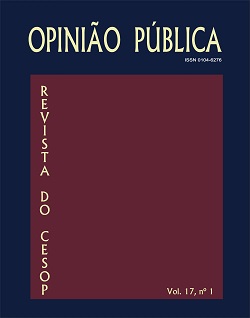Resumo
Este artigo oferece uma proposta de reforma incremental do sistema eleitoral da Câmara dos Deputados. A natureza incremental da proposta se funda na suposição segundo a qual o sistema político é uma arquitetura complexa e delicada, sendo a possibilidade de piorá-lo com mudanças ambiciosas e intempestivas bem maior do que a de aperfeiçoá-lo. A proposta mantém o sistema de representação proporcional com lista aberta, mas altera duas variáveis-chave, uma vez que reduz a magnitude média das circunscrições eleitorais e estabelece uma regra proporcional de distribuição de cadeiras entre partidos coligados. A operacionalização da reforma leva a um novo desenho do mapa eleitoral do país, com circunscrições eleitorais menores dentro de 12 estados. O artigo também apresenta os resultados de um exercício de simulação feito com base nos dados das eleições de 2006 que recalcula a composição partidária da Câmara dos Deputados a partir das regras aqui preconizadas.
Abstract:
This article presents a proposal for an incremental reform of the electoral system of the Chamber of Deputies. The incremental nature of the proposal rests on the assumption that this political system is a complex and delicate architecture, and therefore, abrupt and ambitious changes are more likely to make it worse than to improve it. The proposal advocated here maintains the current system of open-list proportional representation, but it changes two key variables of this electoral system, since it reduces its average district magnitude and establishes a proportional distribution of seats among parties that form electoral coalitions. The way the reform is operationalized leads to a redesign of the electoral map of the country, with smaller districts within 12 states. The article also presents the results of a simulation exercise based on data from the 2006 elections, whereby the party makeup of the Chamber of Deputies is recalculated according to the rules proposed here.
Keywords: Chamber of Deputies, open-list proportional representation; legislative fragmentation; electoral reform; incrementalism
Referências
ABRANCHES, S. H. “Presidencialismo de coalizão: o dilema institucional brasileiro”, Dados, 31: 5-38, 1988.
ALESINA, A.; ROUBINI, N. e COHEN, G. Political cycles and the macroeconomy, Cambridge: The MIT Press, 1997.
AMES, B. The deadlock of democracy in Brazil, Ann. Arbor: The University of Michigan Press, 2001.
AMORIM NETO. O. e COX, G. W. “Electoral institution cleavage structure, and the numbers of parties”, American Journal of Political Science 41(1): 149-174, 1997.
AMORIM NETO. O. Presidencialismo e Governabilidade nas Américas, Rio de Janeiro: FGV Editora, p. 71-96; 97-120, 2006.
BENOIT, K. “The endogeneity problem in electoral studies: a critical re-examination of Duverger’s mechanical effect”, Electoral Studies 21(1): 35-46, 2002.
CARVALHO, N. R. E no Início Eram as Bases: Geografia Política do Voto e Comportamento Legislativo no Brasil, Rio de Janeiro: Editora Revan, 2003.
COX, G. W. Making Votes Count: Strategic Coordination in the World’s Electoral Systems, New York: Cambridge University Press, 1997.
COX, G. W. e MCCUBBINS, M. D. “The Institutional Determinants of Economic Policy, In: HAGGARD, S. e MCCUBBINS, M. D. (Orgs.), Presidents, Parliaments, and Policy, Cambridge: Cambridge University Press, pp. 21-63, 2001.
DUVERGER, M. Les Partis Politiques, Paris: Armand Collin, 1951.
FIGUEIREDO, A. e LIMONGI, F. “Poder de agenda na democracia brasileira: desempenho do governo no presidencialismo pluripartidário”, In: Reforma Política, lições da história recente. SOARES, A. D. G. e RENNÓ, R. L. (orgs.), Rio de Janeiro: FGV Editora, p. 249-280, 2006.
LAAKSO, M. e TAAGEPERA, R. “Effective Number of Parties: A Measure with Application to West Europe”, Comparative Political Studies 12:3-27, 1979.
LIJPHART, A. Electoral Systems and Party Systems: A Study of Twenty-Seven Democracies 1945-1990, New York: Oxford University Press, 1951.
LIMA JÚNIOR, O. B. e SANTOS, F. “O Sistema Proporcional no Brasil: Lições de Vida”, In: LIMA JÚNIOR, O. B. (org.), Sistema Eleitoral Brasileiro: Teoria e Prática, Rio de Janeiro: Rio Fundo, p. 152, 1991.
LIMONGI, F. “Presidencialismo e governo de coalizão”, In: AVRITZER, L. e ANASTÁSIA, F. (orgs.), Reforma política no Brasil, Belo Horizonte: Editora UFMG, p. 237-257, 2006.
MELO, M. A. “Her Majesty the President of Brazil,” Valor Econômico, São Paulo, 10 de maio, p. A6, 2011.
MONROE, B. L. and ROSE, A. G. “Electoral System and Unimagined Consequences: Partisan Effect of District Proportional Rule”, American Journal of Political Science, 46(1): 67-89, 2002.
MUKHERJEE, B. “Political Parties and the Size of Government in Multiparty Legislatures”, Comparative Political Studies 36(6): 699-728, 2003.
NICOLAU, J. Multipartidarismo e Democracia: Um Estudo Sobre o Sistema Partidário Brasileiro (1985-94), Rio de Janeiro: FGV Editora, 1996.
NICOLAU, J. “Voto Personalizado e Reforma Eleitoral no Brasil” In: Reforma Política, lições da história recente SOARES, A. D. G. e RENNÓ, R. L. (orgs.), Rio de Janeiro: FGV Editora, p. 23-33, 2006.
ORDESHOOK, P. C. e SHVETSOVA, O. V. “Ethnic heterogeneity, district magnitude, and the number of parties”, American Journal of Political Science 38(1): 100-123, 1994.
RAE, D. W. The Political Consequences of Electoral Laws, New Haven: Yale University Press, 1967.
SAMUELS, D. “Financiamento de campanha no Brasil e proposta de reforma”, In: Reforma Política, lições da história recente SOARES, A. D. G. e RENNÓ, R. L. (orgs.), Rio de Janeiro: FGV Editora, p. 133-153, 2006.
SAMUELS, D. “Presidentialism and Accountability for the Economy in Comparative Perspective”, American Political Science Review 98(3): 425-436, 2004.
SANTOS, F. O Poder Legislativo no Presidencialismo de Coalizão, Belo Horizonte: Editora UFMG, p. 29-110, 2003.
SCHRÖDER, B. Regimes, Governos e Carga Tributária no Brasil (1946-2007), Dissertação de Mestrado, Escola de Pós-Graduação em Economia, Fundação Getulio Vargas, Rio de Janeiro, 2009.
TAAGEPERA, R. e SHUGART, M. S. Seats and Votes: The Effects and Determinants of Electoral Systems, New Haven: Yale University Press, 1989.
TAAGEPERA, R. e SHUGART, M. S. “Predicting the number of parties: a quantitative model of Duverger’s mechanical effect,” American Political Science Review 87(2): 455-464, 1993.
TAVITS, M. “Clarity of Responsibility and corruption”, American Journal of Political Science 51(1): 218-229, 2007.
A Opinião Pública utiliza a licença do Creative Commons (CC), preservando assim, a integridade dos artigos em ambiente de acesso aberto.

